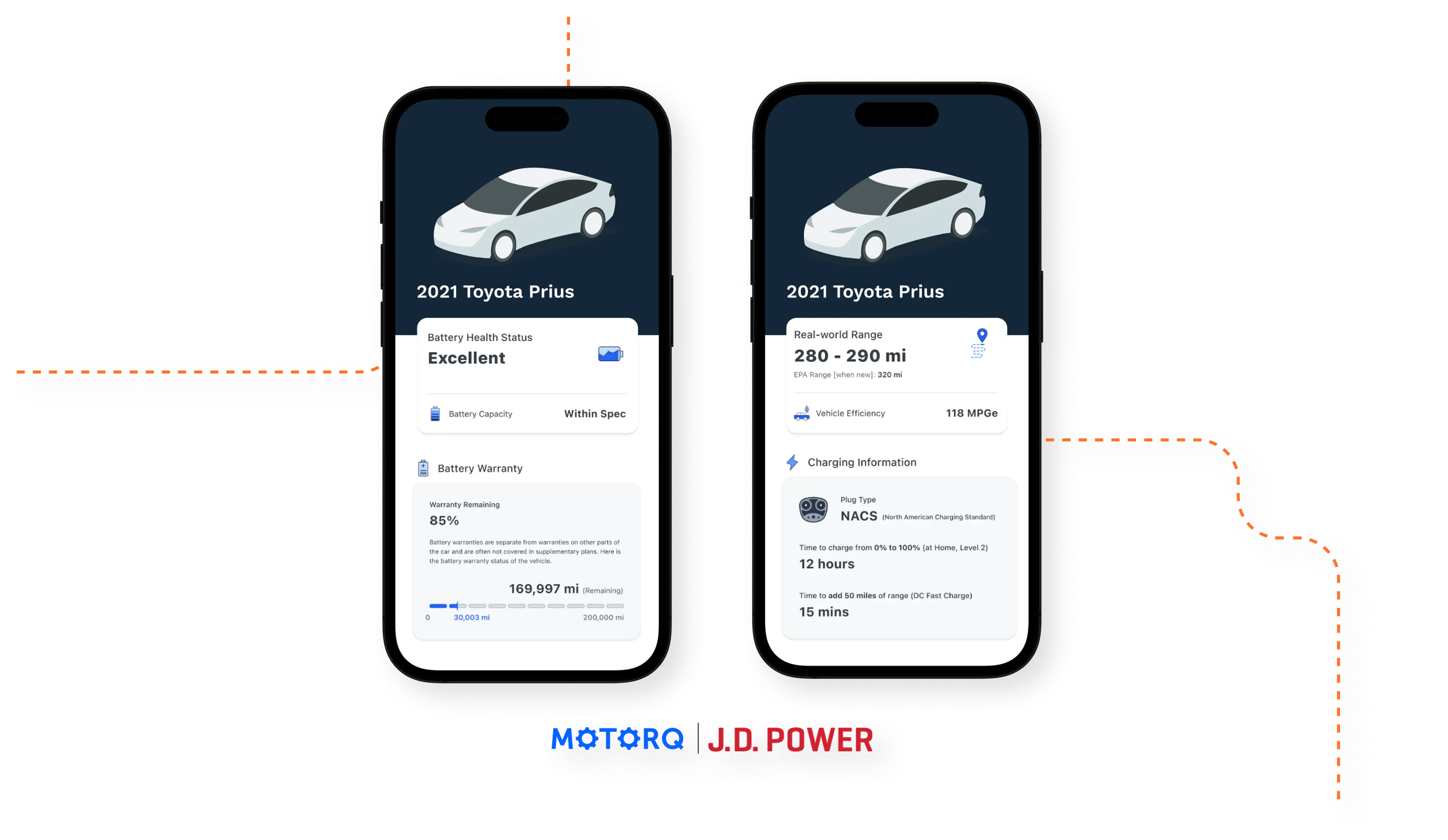Everything About Buying and Selling Used EVs is About to Change

Determining the price of a used ICE vehicle is often as easy as looking at the odometer or under the hood and seeing, right then and there, an issue such as a fluid leak or rust-colored oil. With an EV you can’t do that. But you can do so much more – and without ever setting eyes on the vehicle itself.
EV Remarketing 101: The True Definition EV Value
An EV battery makes up about 40% of an EV’s overall value. In the auto industry, we know this statistic by heart but have yet to master retaining battery value long-term.
How do you prove an EV battery retained its initial value when it is put on sale years into EV ownership?
The Motorq Battery Health Report is a data-backed analysis of the true status of important vehicle components. This report is available today and will soon be available as a certificate for anyone looking to advertise the value of their vehicle.

Proving long-term EV resale value requires more than surface-level data. Selling millions of used vehicles demands uncovering the genuine value of EVs – and in a way that can be easily marketed in both digital and physical marketplaces.
How OEM-Backed Insights Deliver Accurate EV Resale Prices
Over the past five years, Motorq has analyzed data from thousands of EVs across multiple OEMs. The great news is, EV batteries typically retain much of their original value and remain "like new" long after being driven.
Here's how this data is transformed into real-world analysis that confirms an EV's full resale potential using behavior straight from the vehicle itself.
How We Do It: Going Beyond Simple Point-in-Time Range Scoring
- Battery Health: What is the current health status of the vehicle's battery?
- Battery Capacity: Is it within specifications, or does it fall outside the expected range?
- Real-World Range: What distance can the vehicle cover on a single charge in real-world conditions?
- EPA Range When New: What was the Environmental Protection Agency's estimated range when the vehicle was new? How does your EV's range today currently rank against that?
- Vehicle Efficiency: How efficient is the vehicle, measured in MPGe (miles per gallon equivalent)?
- Charging Times: How long does it take to charge the vehicle from 0 to 100% using a standard Level 2 Charger? Additionally, how much time is needed to add 50 miles of range using a DC Fast Charger?
- Remaining Miles on Battery Warranty: What is the remaining coverage on the battery warranty?
- Predicted Range: Based on various factors, what is the expected range the vehicle can achieve?
A Note About Data vs. Insights
Motorq analyzes data across various vehicles and OEMs to provide a comprehensive assessment of each EV's performance and worth. If one EV was driven 200 miles and another EV was driven 280 miles, and one of these was driven in winter conditions in Minneapolis while the other was driven in Miami in June, the two vehicles are compared and the data is normalized. Labeling vehicle one with a lower health score based off of snapshot charge metrics leads to a mistaken lower value for the seller, and everyone else in that selling chain.
What Makes OEM Electric Vehicle Data So Unique?
Everything Motorq does is based on turning real vehicle data into real vehicle insights. We’ve built a business on it, and we stand on both the quality of our data and the quality of our science.
We also recognize that today is an important moment in the EV evolution. Everyone in this industry has an opportunity to build trust with their customers and partners; as stewards of your data, we regard trust as a responsibility. That’s part of why we analyze thousands of data points for every assessment we run and every certificate we issue. Because it’s important that it’s as accurate as possible.
There’s industry-changing access to EV data. But what if your business and your consumers are expecting more?
Historical EV data goes the extra mile in order to tell the complete vehicle narrative. The simplest method of calculating approximate EV health is taking current range, dividing it by SOC, and generating your vehicle’s actual range in one easy step. For example, let’s say the vehicle dashboard is showing 98 miles of range and 35% remaining charge. These two numbers are divided to produce range results across your entire fleet (or in the case of a consumer, for their vehicle) of 98/.35 = 280.
Since these dashboard readings can vary, we’ve normalized the underlying data to go beyond point-in-time readings and provide an extra layer of analysis. The remaining range on an EV can change dramatically as you drive and also varies considerably under different conditions. Imagine having ultimate certainty in your EV analysis – an analysis backed with battery capacity and efficiency for a trifecta of EV truth.
Real-world EV insights individualize vehicle estimates so you can predict true health, and thus ROI, with confidence. Why forfeit accuracy when EV assessments can provide real answers?
Why a Trustworthy EV Assessment Transforms the Marketplace
According to survey data from our partner J.D. Power, consumer trust is imperative.
90%
90% of consumers said they would pay more for a vehicle with a battery health certificate.
$500
Half of consumers said they would pay $500 or more for a vehicle with a health certificate versus one without.
Today, 2.7 million EVs are operating in the U.S. and that number is growing. Those cars will end up at auction and we're making the investment now to be prepared for those cars.
The impact of an authentic EV health assessment extends beyond individual transactions. Vehicle value assessment can be simple, trustworthy, and accessible for both digital and in-person sales. Consumers expect to trust the expected range and listed value of a vehicle is real when making a purchase decision. And businesses deserve to be recognized in EV marketplaces when they've responsibly retained the value of a $45,000 asset.
The statistics included above are from our partner, J.D. Power, as presented in the Motorq-J.D. Power battery health webinar.
This post contains a section contribution from Ethan Alter, who leads Product Marketing at Motorq and heads product marketing development for Motorq's EV Battery Health Score product.